What Type Of Auto Insurance Do I Need In Colorado Springs?
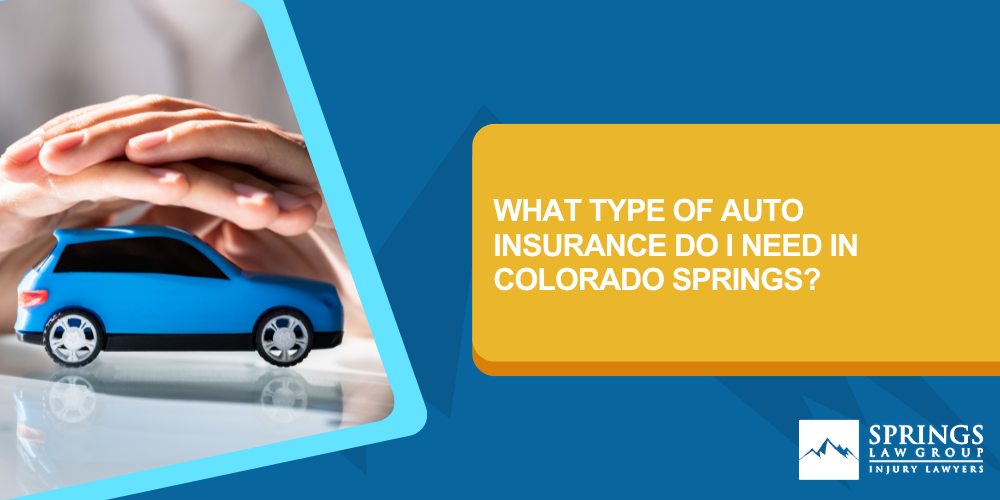
Auto Liability Coverage
Liability coverage applies to damage you cause other people or property. “Liability” basically means legally responsibility. Your liability insurance kicks in when, because of a mistake you’ve made that’s covered under your policy (e.g., you accidentally rear-end someone), you cause damage to another person’s body or property. It is important to remember that liability damage will not pay for your own damages; those types of losses require a different type coverage, discussed below.
Most state laws will require you carry a certain minimum amount of liability insurance. In Colorado, you are required to have liability insurance that covers at least $25,000 per person for bodily injury; $50,000 per accident for bodily injury; and $15,000 per accident for property damage. You’ll often see this written as $25,000/$50,000/$15,000. It means, when you cause an accident that is covered under your policy, it will pay the injured person up to $25,000 for bodily injuries, except that it won’t pay more than $50,000 for any given accident, and it will also cover up to $15,000 of property damage you cause.
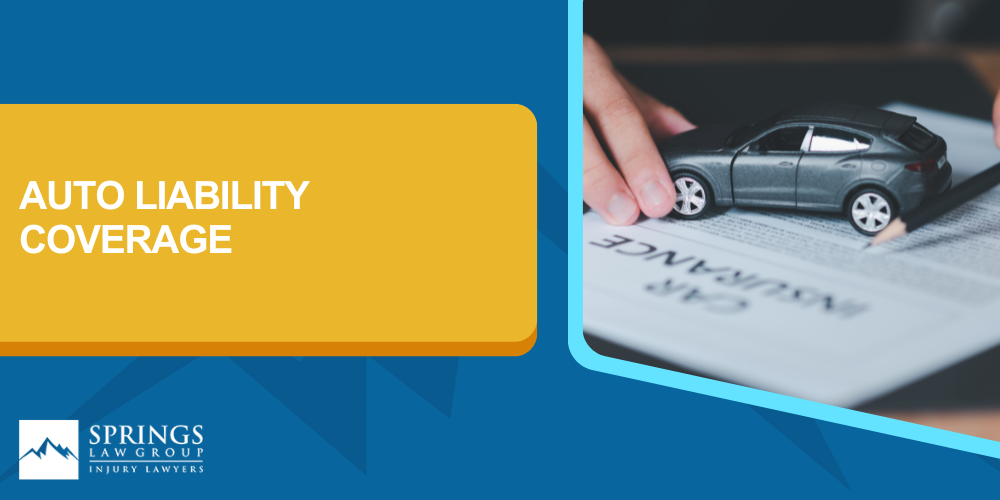
It is usually a good idea to have liability insurance higher than the legal requirement because you are personally on the hook for any damages above your limit. While $25,000 might seem like a lot of money, with the modern cost of healthcare being as high as it is, an extended hospital stay alone could easily surpass that amount, not to mention the injured person’s missed time at work, future medical expenses, pain and suffering, scarring, and other damages.
Liability coverage also applies if you get sued. If the lawsuit falls within the policy’s coverage, the insurance company will hire and pay for an attorney to defend you, and will pay for any settlement or jury award up to the limits of the policy.
Auto Collision Coverage
Collision coverage applies to damages to your own vehicle that are caused by collisions with other vehicles or objects, or rollovers. Collision coverage will pay for repairs to your vehicle up to the value of your car. If repair costs exceed your car’s value, then collision coverage will pay you for the value of your car. For this reason, if your car isn’t worth much, it might not be worth purchasing collision coverage because the most it will pay out is however much your car is worth.
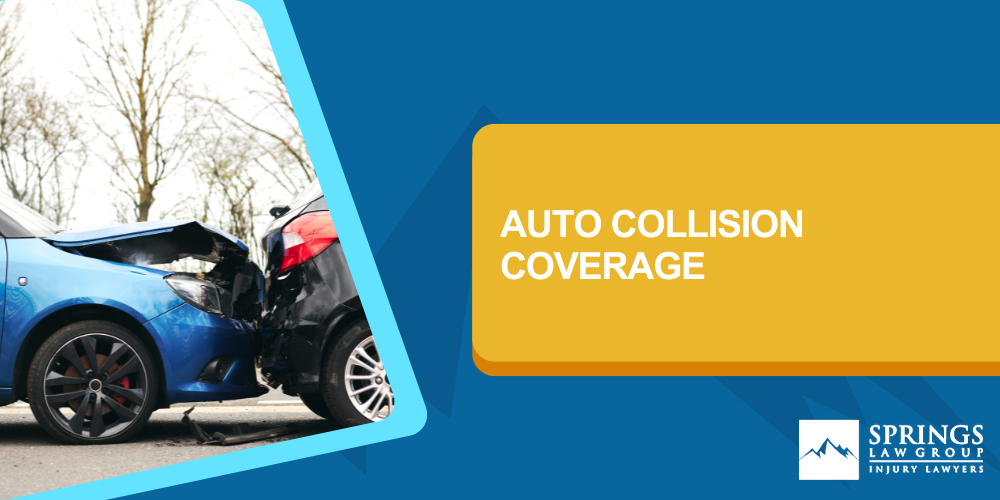
That being said, if you have an auto loan, your lender will almost certainly require that you keep a certain amount of collision coverage. Your car is the collateral for their loan; if you can’t pay off their loan, they’ll usually want to repossess your car. If your car is rendered worthless by damage, they lose their collateral. Therefore, they want you to keep the car covered with collision to reduce their risk that they don’t get repaid on their loan.
Comprehensive Coverage
Comprehensive coverage should cover most other types of damage to your vehicle not covered by collision coverage or another driver’s liability insurance. For example, comprehensive coverage is what you’d want to get to cover your car getting stolen or damaged by acts of nature. It also covers damage caused by things like vandalism, riots, flooding, hail, fire, and animal collisions. If you live in Colorado, either you or someone you know has probably had their car damaged by wind or hail in the last year alone, which would have triggered comprehensive coverage.
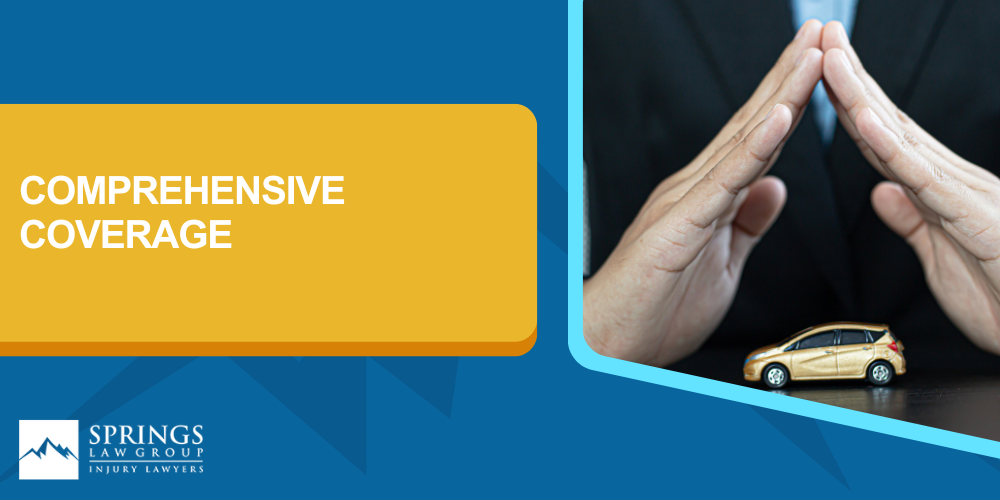
Due to the expense of comprehensive coverage, you may want to decline it if your car isn’t worth much. However, as with collision coverage, if you have an auto loan on your car, then the lender will most certainly require you cover the vehicle with comprehensive coverage.
Uninsured/Underinsured Motorist (UM/UIM) Coverage
Uninsured/underinsured motorist coverage—commonly abbreviated “UM/UIM”—is extremely important. It pays for damages that you or people in your car suffer due to an accident caused by someone who has no insurance (uninsured), not enough insurance (underinsured), or hit-and-runs (unknown insurance).
You might think that uninsured or underinsured drivers are rare, but sadly they are quite prevalent. According to the Insurance Information Institute, Colorado has the 9th most uninsured drivers in the nation, at 16.2% of drivers! That’s about one in every six drivers. Imagine sitting at a stop light: odds are, at least one of the other drivers at the intersection with you is driving without insurance. The type of driver who drives without insurance is not the type of driver who keeps a savings account full of cash ready to pay for your medical bills. Instead, you’re likely stuck paying for your own bills unless you have UM/UIM coverage.
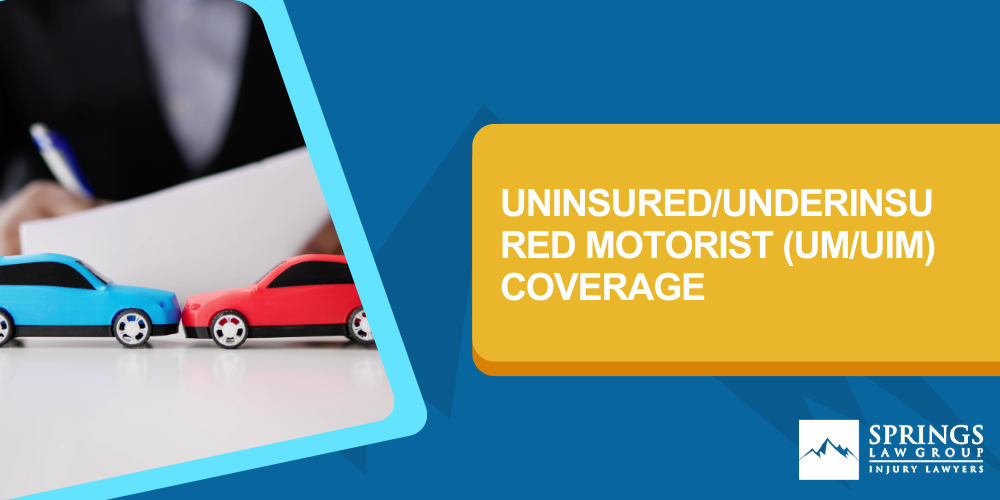
Even more common is the driver who doesn’t carry enough insurance. Medical care is expensive and is only getting more expensive. As mentioned above, Colorado’s minimum liability limit is $25,000, which can be eaten up by just a moderate accident, let alone a major one.
You may think you can count on your health insurance to cover your losses, but it probably wouldn’t be enough. Your health insurance may cover a portion of your bills—after you meet your deductible, of course!—but it won’t help you if you miss work, or become partially impaired or disabled because of the accident, and it won’t pay for any of the pain or suffering you have because of the accident.
Usually, uninsured/underinsured coverage is relatively inexpensive. We highly recommend you get it if you can afford it.
Medical Payments (MedPay) Coverage
Medical payments (abbreviated “medpay”) will cover medical expenses to you or others in your vehicle, regardless of whose fault the accident is. Medpay is extremely helpful, especially for treatment not covered by health insurance and below-deductible expenses. However, keep in mind, medpay only covers medical expenses, so it won’t help you with other losses, like time missed from work, property damage, pain and suffering, or funeral expenses.
Medpay can also be helpful when the accident is not your fault and the other driver has plenty of insurance. Because insurance settlements can take some time—and perhaps even a lawsuit—it may be years before the other driver’s insurance pays you for your medical expenses. In the meantime, you could be racking up bills you may not be able to afford, which could hurt your credit. Medpay could cover those and make the wait for the other driver’s insurance more bearable and less financially devastating.
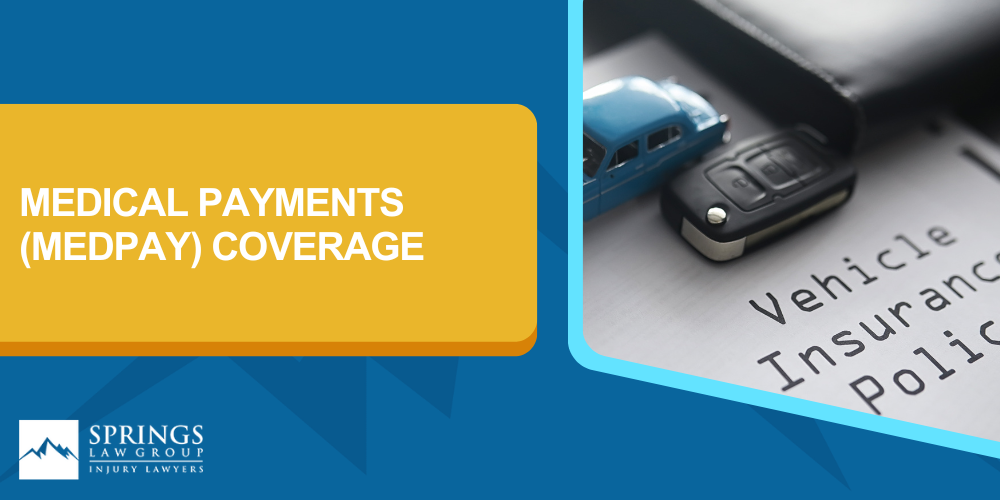
Medpay is relatively inexpensive for the coverage you can get. Therefore, if you can afford it, it is probably a good idea to get at least enough to cover your health insurance deductible and co-pays, if not more.
Conclusion
Buying auto insurance can be a confusing and frustrating process. It’s almost always going to feel too expensive. However, buying the right type of insurance could save you from financially devastating events that are entirely outside your control. Therefore, it is worth it to take some extra time to evaluate your needs and purchase the right insurance for your budget.

If you have been involved in an auto accident and feel that your insurance or another person’s insurance isn’t paying for losses you believe are covered, give the experienced lawyers at Springs Law Group a call at 719.421.7141. You can also contact us online to schedule your free initial consultation. We can discuss with you whether your loss is likely to be covered and whether an attorney could help you get the compensation you need to move on with your life.
